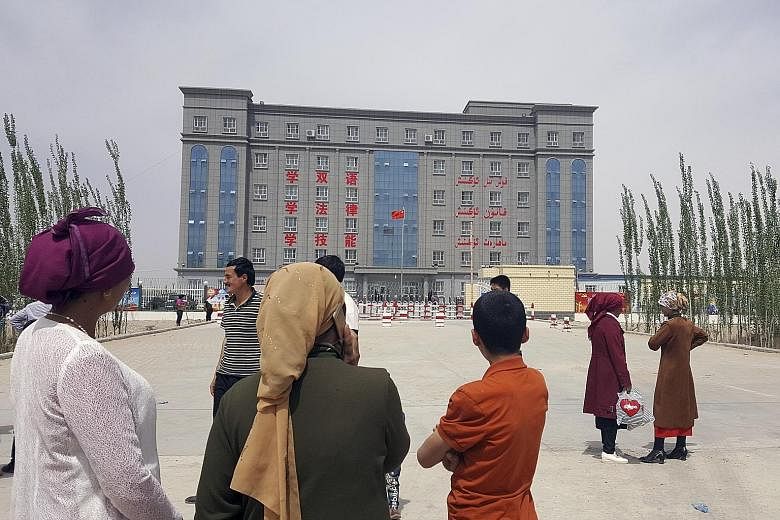HOTAN (China) • On the edge of a desert in far western China, an imposing building sits behind a fence topped with barbed wire. Large red characters on the facade urge people to learn Chinese, study law and acquire job skills. Guards make clear that visitors are not welcome.
Inside, hundreds of ethnic Uighur Muslims spend their days in a high-pressure indoctrination programme, where they are forced to listen to lectures, sing songs praising the Chinese Communist Party and write "self-criticism" essays, according to former detainees.
The goal is to rid them of devotion to Islam.
Mr Abdusalam Muhemet, 41, said the police detained him for reciting a verse of the Quran at a funeral. After two months in a nearby camp, he and more than 30 others were ordered to renounce their past lives. Mr Muhemet said he went along but quietly seethed.
"That was not a place for getting rid of extremism," he recalled. "That was a place that will breed vengeful feelings and erase Uighur identity."
This camp outside Hotan, an ancient oasis town in the Taklamakan Desert, is one of hundreds that China has built in the past few years.
It is part of a campaign of breathtaking scale and ferocity that has swept up hundreds of thousands of Chinese Muslims for weeks or months of what critics describe as brainwashing, usually without criminal charges.
Though limited to Xinjiang, it is China's most sweeping internment programme since the Mao era - and the focus of a growing chorus of international criticism.
China has sought for decades to restrict the practice of Islam and maintain an iron grip in Xinjiang, a region where more than half the population of 24 million belongs to Muslim ethnic minority groups. Most are Uighurs, whose religion, language and culture, along with a history of independence movements and resistance to Chinese rule, have long unnerved Beijing.
After a series of violent anti-government attacks reached a peak in 2014, President Xi Jinping sharply escalated the crackdown, orchestrating an unforgiving drive to turn ethnic Uighurs and other Muslim minorities into loyal citizens and supporters of the party.
In addition to the mass detentions, officials have intensified the use of informers and expanded police surveillance, even installing cameras in some people's homes.
Yesterday, United Nations human rights chief Michelle Bachelet called on China to allow in monitors after "deeply disturbing" allegations of large re-education camps in Xinjiang.
The new UN rights chief also decried crackdowns on minorities in countries like Myanmar, and urged Western nations to respect migrant rights, warning that erecting walls caused only chaos and suffering.
Ms Bachelet, a former Chilean president making her maiden speech to the UN Human Rights Council, said the panel had brought to light "deeply disturbing allegations of large-scale arbitrary detentions of Uighurs and other Muslim communities in so-called re-education camps across Xinjiang".
Pointing to reports that documented patterns of rights violations in other regions as well, she said: "We would request the government to permit access for the (UN rights) office to all regions of China, and trust we will embark on discussion of the issues."
China has categorically denied reports of abuses in Xinjiang.
At a meeting of a UN panel in Geneva last month, it said it does not operate re-education camps and described the facilities in question as mild corrective institutions that provide job training.
The New York Times interviewed four recent camp inmates from Xinjiang who described physical and verbal abuse by guards; and the gnawing anxiety of not knowing when they would be released.
The Chinese government says it is winning a war against Islamic extremism and separatism.
NYTIMES, REUTERS, AGENCE FRANCE-PRESSE


